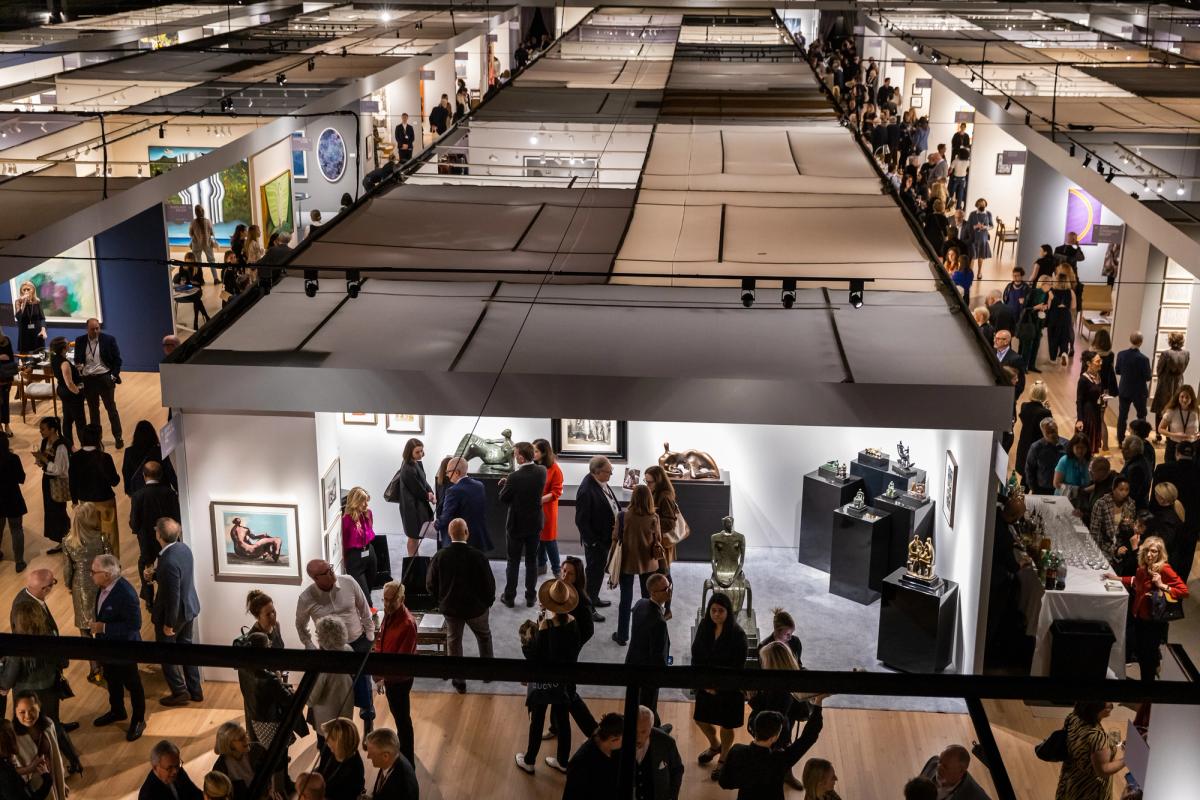The 35th edition of The Art Show, the annual fair put on by the Art Dealers Association of America (ADAA), kicked off with a benefit preview Thursday evening (1 November) at the Park Avenue Armory on New York’s Upper East Side. From the works on view to the celebrities in attendance, the event once again reinforced why it has become a highlight of the trade's autumn calendar.
The aisles of the armoury’s expansive drill hall were bustling throughout the evening, with particularly dense bottlenecks forming at the bars, the steamed dumpling station and anywhere near the reported sightings of star attendees Bruce Springsteen, Tom Hanks and Steven Spielberg. Sales were brisk for some dealers, too, as Miles McEnery Gallery's solo presentation of paintings by Emily Mason sold out within an hour of the preview's opening, at prices from $65,000 to $80,000 each.
This year's fair features 78 stands, with 57 of those highlighting a single artist. New ADAA members staging their inaugural Art Show presentations include Anat Ebgi Gallery, a Los Angeles-headquartered dealer who has synced up the soft opening of her Tribeca expansion to the fair.
For years, the fair’s ticket sales proceeds have gone to The Henry Street Settlement, a 130-year-old nonprofit agency on New York’s Lower East Side that provides social services and art programmes to the local community. General admission for the fair starts at $30, and the priciest premium package for the benefit preview cost $50,000. The fair raised more than $1m on Thursday evening alone.
Although The Art Show is compact compared with major international fairs such as Art Basel or Frieze London, its stands still bring together hundreds of works, making it difficult to give every artist equal attention. To help guide your visit, below are five superlative presentations—a label indicating not just high quality but a standout trait that no other display at the fair can match.
Most monumental: Sheila Hicks at Sikkema Jenkins & Co.
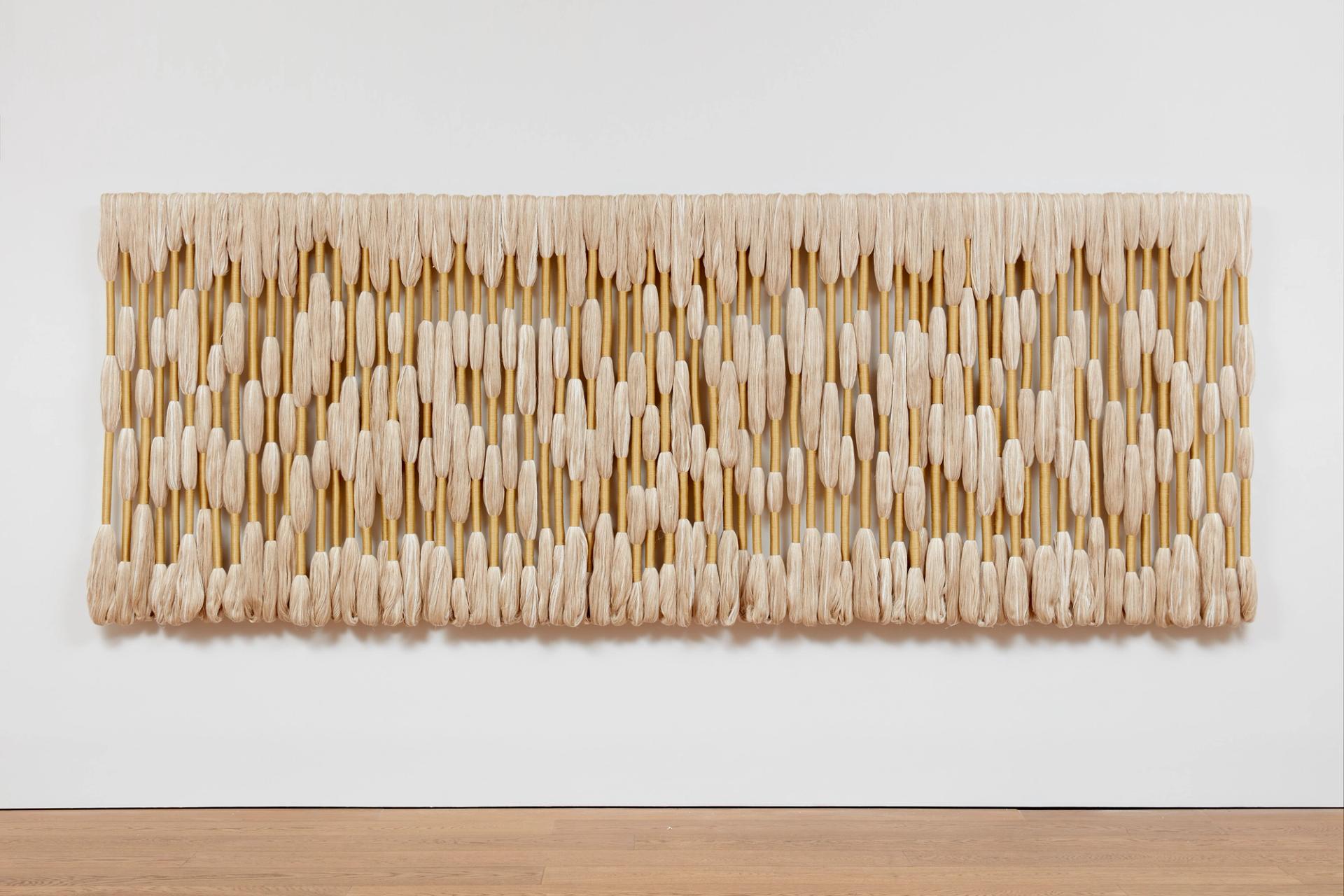
Ondine (2022-23) by Sheila Hicks. © Sheila Hicks, courtesy of Sikkema Jenkins & Co., New York
The largest work at this year's Art Show is American artist Sheila Hicks's Ondine (2022-23), which measures more than 15ft wide by five ft high. It forms the focal point of New York gallery Sikkema Jenkins & Co.'s stand near the main entrance, making the work a kind of gravitational centre of the entire event.
Meg Malloy, a partner at the gallery, describes the tapestry as “an environment” made from a series of twisted cords of linen and cotton wrapped with silk. Although the work comes from an ongoing series, Hicks, now 89 years old, created Ondine specifically for The Art Show. Its price of $1m is no small matter, either.
Most miniature: Jasmin Sian at Anthony Meier
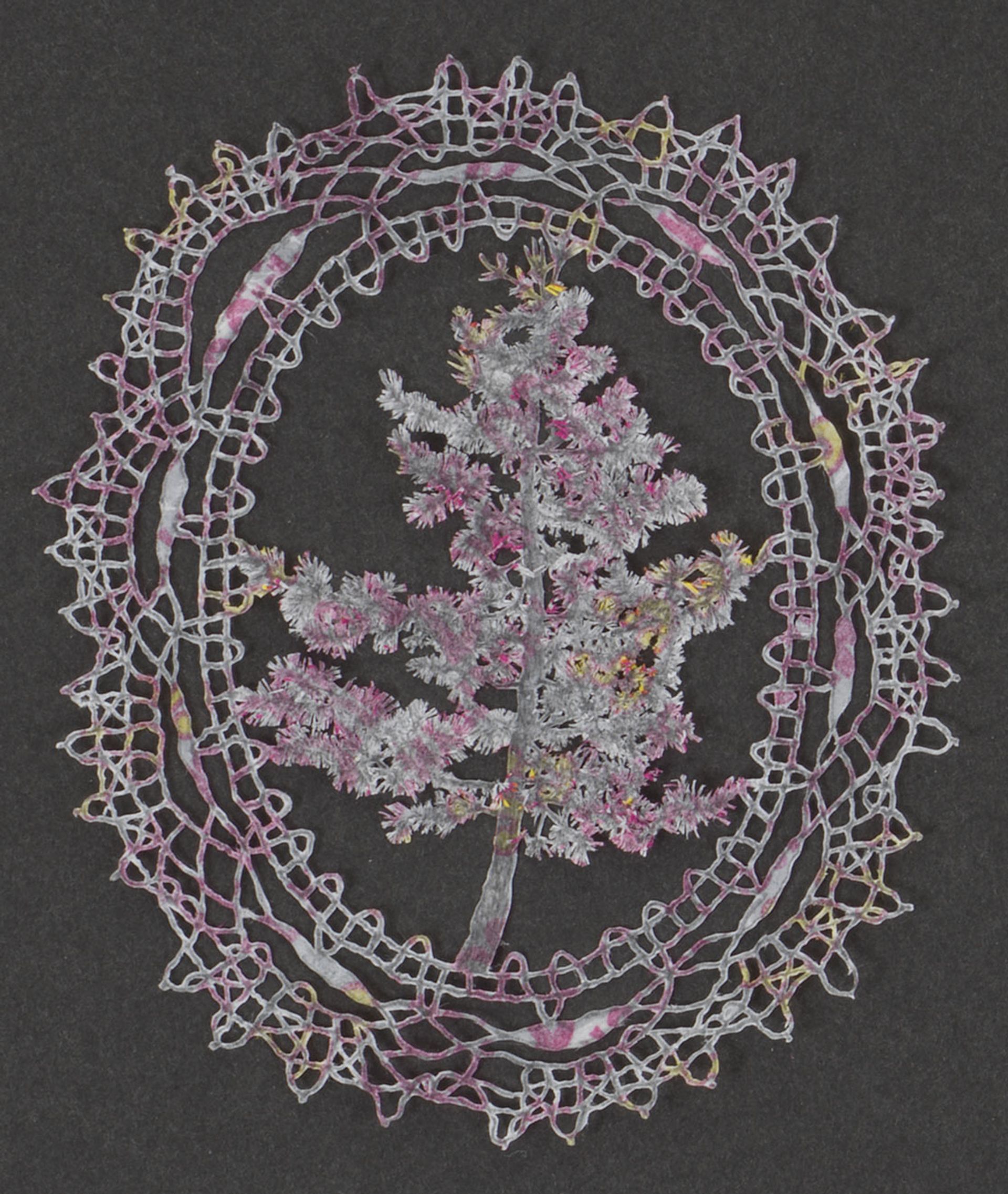
Sian carved images of trees out of Dum-Dum lollipop wrappers. Christopher Burke, NYC
The smallest works at the fair are being presented by Bay Area gallery Anthony Meier, which has dedicated its stand entirely to artist Jasmin Sian. Sian uses an X-Acto knife to carve intricate, lace-like patterns and images out of paper and other recycled materials. Director Kristin Delzell says much of the artist's work is inspired by her experiences with nature during daily bike rides through New York City.
The gallery has titled the works in the stand a forest for Fennel, a nod to Sian’s late pet bird, Fennel. After Fennel's death, Sian began etching small tree forms into paper, a nod to the Chinese tradition of burning paper as an offering for deceased loved ones to use in the afterlife. The intimately scaled pieces each measure just a few inches across and around 30 hours to complete. Prices range from $7,500 to $15,000.
Most illusionistic: Bertozzi & Casoni at Sperone Westwater
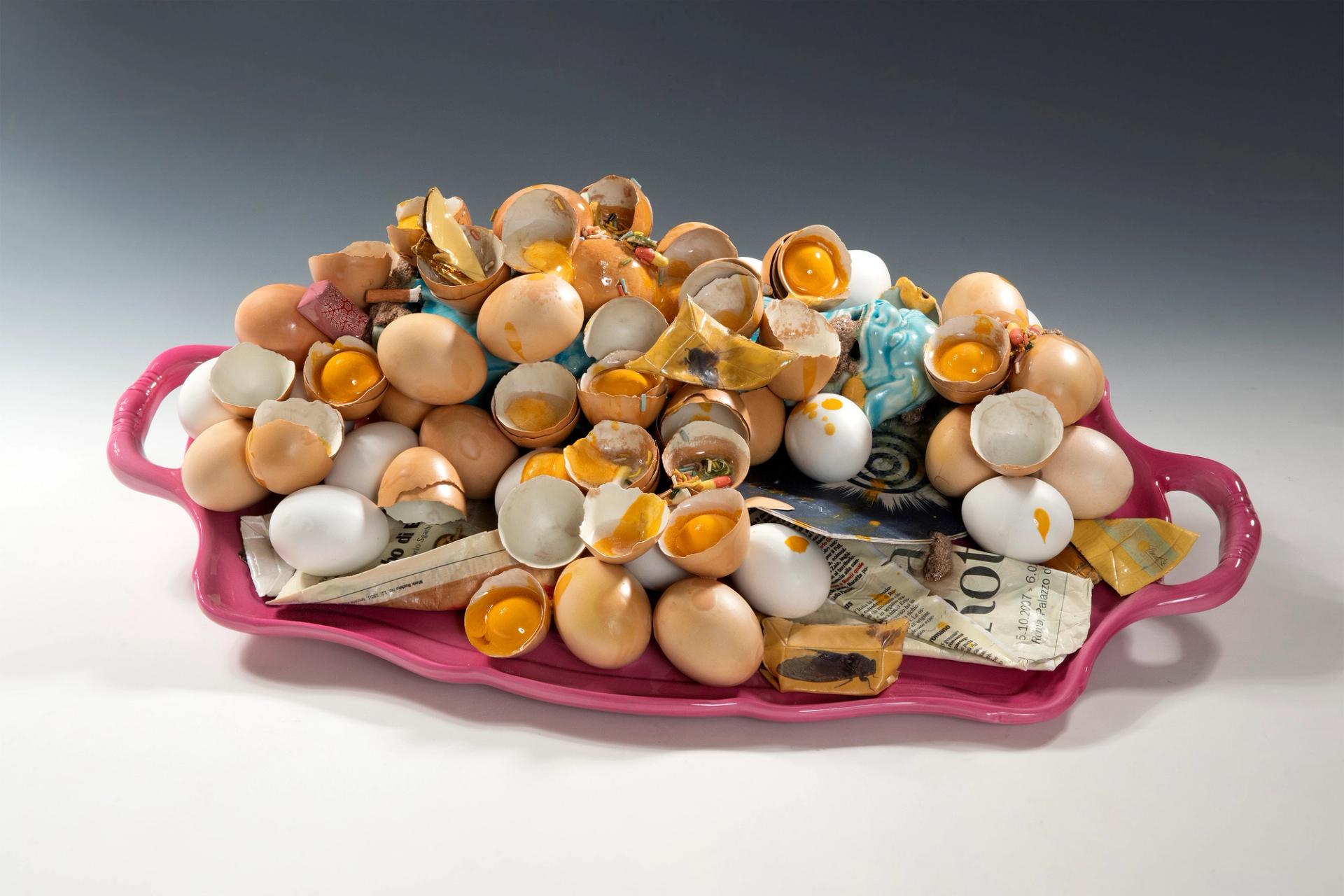
Vassoio con drago cinese (2023) by Bertozzi and Casoni. Courtesy Sperone Westwater
At first glance, Sperone Westwater’s stand looks like someone forgot to clean up a series of curious messes, such as a platter of broken eggs and apple peels, a stack of discarded cardboard boxes and a paint bucket full of watermelon slices. But a closer look reveals that each tableau is an expertly crafted ceramic sculpture by the Italian duo Giampaolo Bertozzi and Stefano Dal Monte Casoni (the latter of whom died this year).
The artists previously said “the true essence of things can be found in decay, in everything that has been rejected, in junk, in rubbish. It is in decay where you can perceive true life”. Their work was featured in the Italian Pavilion at the Venice Biennale in both 2009 and 2011. Most of the ceramics for sale at Sperone Westwater’s stand range in price from $25,000 to $65,000.
Most 'I Love New York': Richard Estes at Schoelkopf Gallery
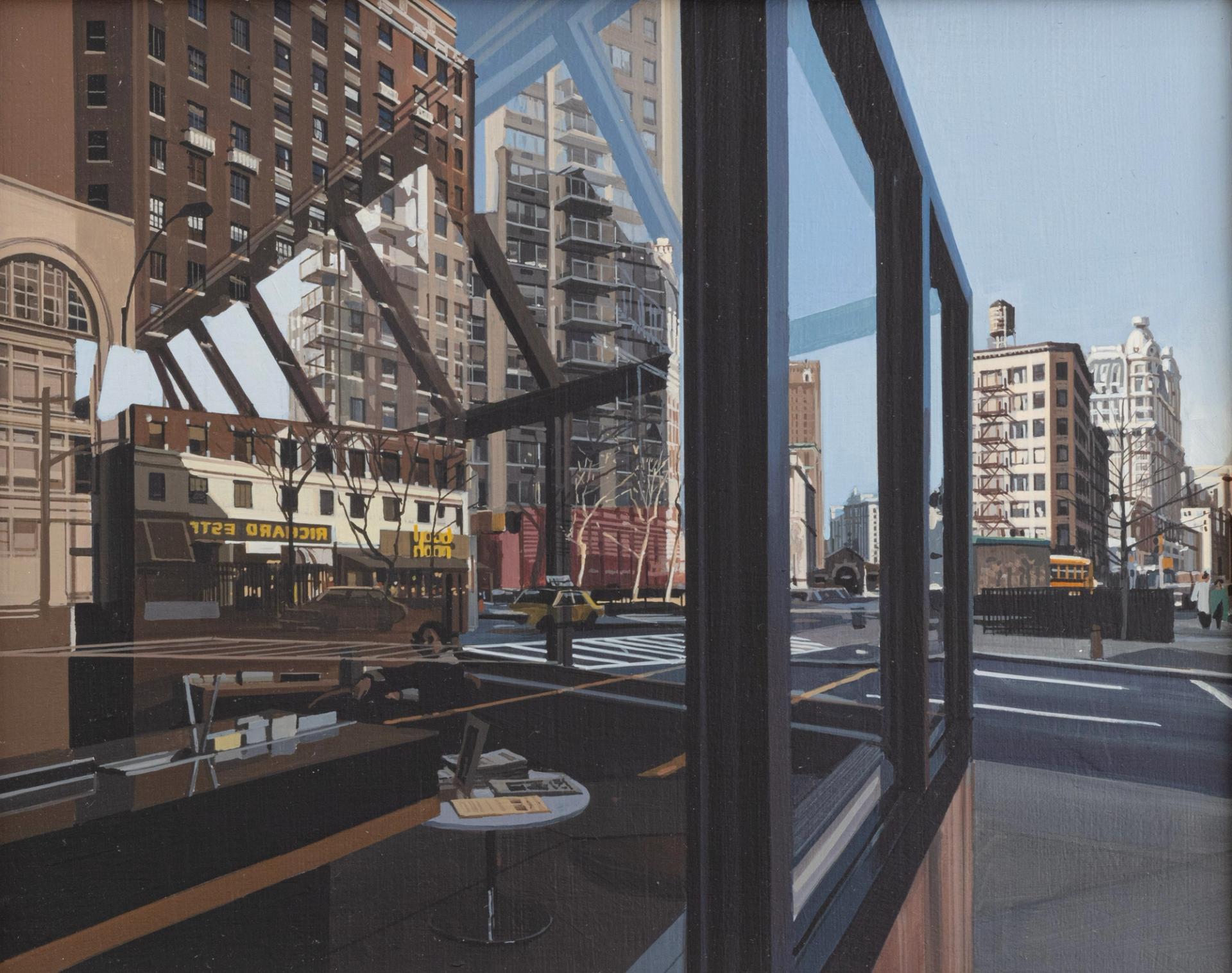
Bagel Nosh (1992) by Richard Estes. Courtesy Schoelkopf Gallery
Schoelkopf Gallery, a specialist in American art, has devoted its stand to Photorealist paintings of the Five Boroughs by East Coast artist Richard Estes. Although Estes's own photos are the basis for his detailed depictions of everyday life in New York, the results selectively deviate from their source material by using optically impossible perspectives, mischievous details only noticeable on close inspection and more. For example, in a 2015 painting of a subway car, the viewer can see both the train's interior and the station outside; a painting of a deli from 1992 manipulates window reflections to create a beguiling composition.
One aspect of Este's practice that can be taken at face value is the demand for his output. The largest painting on the stand, a scene showing commuters riding the Staten Island Ferry, is priced at just more than $1m, while most of the other paintings on view range in price from $185,000 to $450,000 each.
Best re-appraisal: Arvie Smith at Monique Meloche
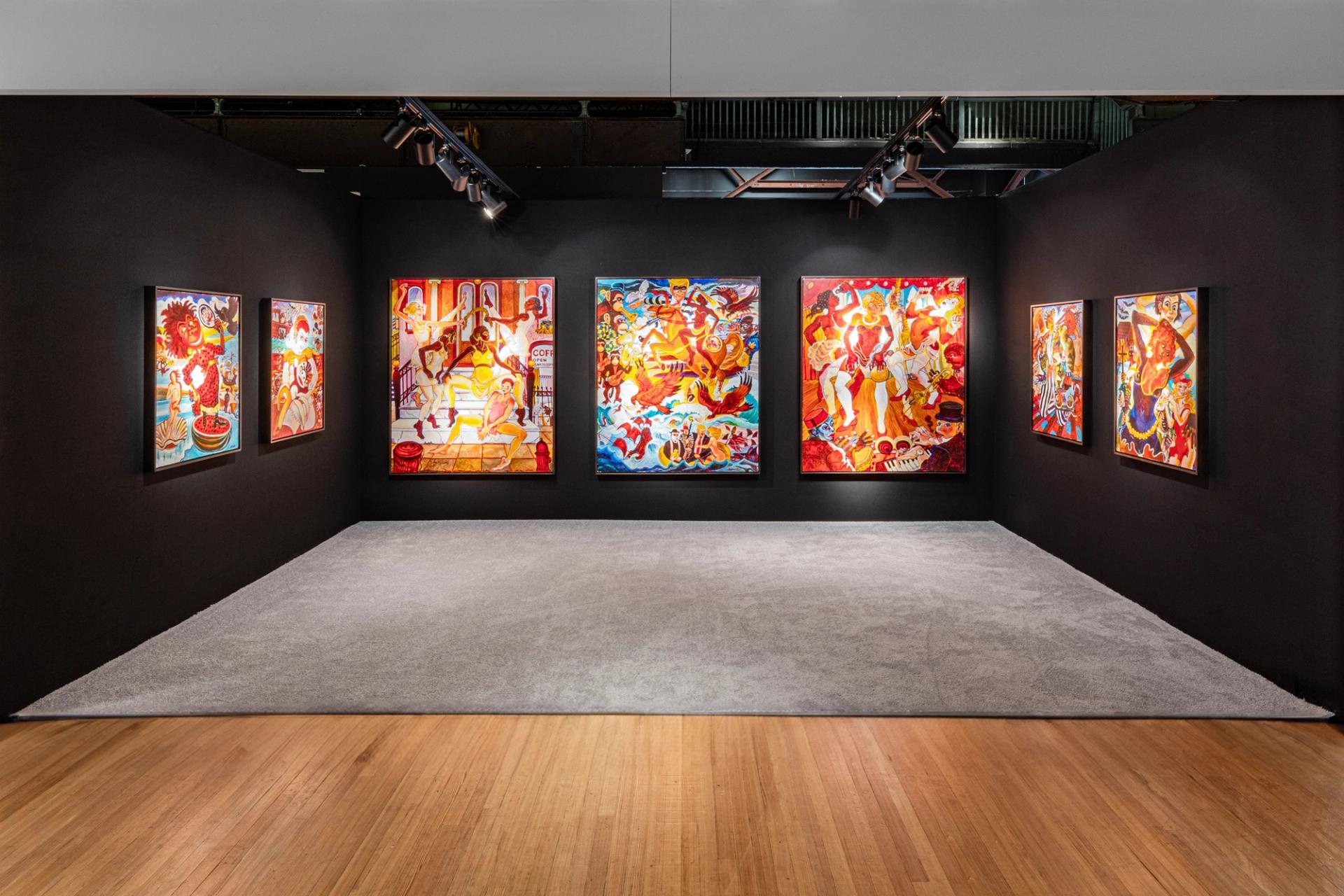
MA shot of Monique Meloche's ADAA Art Show booth featuring work by Arvie Smith. Courtesy Monique Meloche
Chicago dealer Monique Meloche is presenting a solo stand of new works by Arvie Smith, marking the artist’s first exhibition in New York in more than three decades. (His most recent show in the city, at 55 Mercer in 1992, was curated by the post-war American abstractionist Grace Hartigan, Smith’s mentor). The 85-year-old artist uses colourful brushstrokes to tie together his experiences as a Black American with humorous takes on racial stereotypes, contemporary politics and references to the Italian Renaissance.
Meloche and her husband first encountered one of Smith's paintings in the collection of a Los Angeles-based client who had known the artist when they were both living in Baltimore, Maryland. “Our jaws dropped,” she says. “His work and story are so profound, and it was clear right away that he'd tried to get in contact with so many galleries over the years, to no avail.” The gallery staged Smith’s first commercial gallery show in Chicago last year, using work from his archive and new pieces. The paintings on offer at the stand were priced from $25,000 to $50,000.


